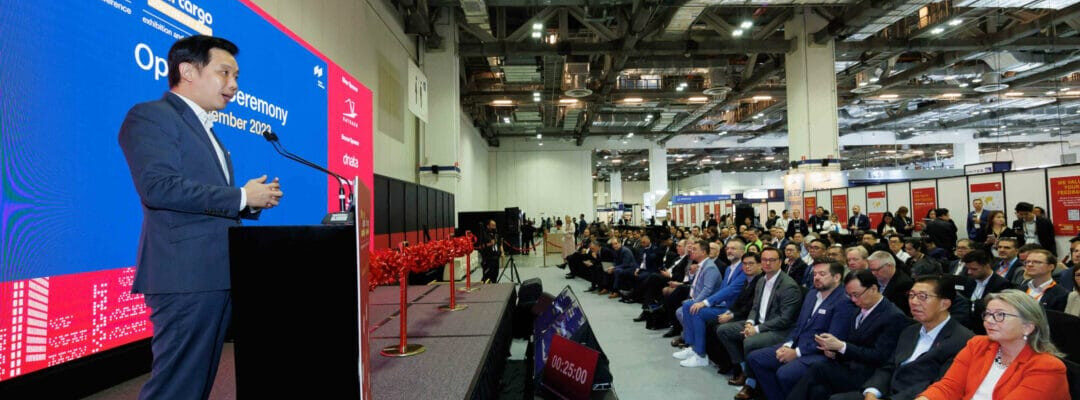Singapore is looking to shape the future of regional supply chains
Singapore is set to become a hub of logistics innovation as Southeast Asia Transport Logistics and Air Cargo Southeast Asia 2025 prepares to open its doors. Hosted by MMI Asia, the event promises to bring together more than 10,000 professionals, 120 exhibitors from 27 countries and more than 150 industry leaders from around the world. From digital transformation and sustainability to human capital and regional infrastructure, the event aims to chart the future of how goods are transported along one of the world’s fastest-growing trade corridors.
Michael Wilton, CEO and Managing Director of MMI Asia, said the event “serves as a catalyst for regional transformation – connecting industry leaders, innovators and emerging talent to shape the future of logistics across ASEAN and beyond.”
Resilient supply chains in an uncertain world
The flagship platform will dive into the pressing realities shaping global logistics. “We are grappling with the dual forces that are reshaping today’s supply chains: shifts in U.S. tariffs and the rapid rise of Southeast Asia as a manufacturing and logistics hub,” Wilton said. The keynote, “From fragile to future-proof: How digital tools and human talent are building truly resilient logistics networks” by Radu Palamario, CEO of Alcott Global Group, sets the tone for a program dedicated to resilience and adaptability.
Wilton added that the discussions will go beyond theory. “Panel discussions such as ‘Southeast Asia’s Transportation and Logistics Horizon’ and ‘Shaping the Future of Supply Chains – Successfully Navigating Transformation’ feature leaders from Google, Boeing and DSM-Firmenich, and discuss how companies can diversify their sourcing, invest in ASEAN infrastructure, and leverage cloud-based planning,” he said. Artificial intelligence. These talks will explore how logistics operators can not only manage tariff-related risks, but also seize the opportunities presented by the region’s expected trade growth of 7% and foreign direct investment inflows of US$46 billion.
“The main takeaway is flexibility through strategy and innovation,” Wilton noted. “Attendees will leave with insights into how technology and talent together can create stronger, more adaptive logistics systems.”
Changi Advantage
A highlight of the event will be the central sessions highlighting the infrastructure driving air freight growth in Southeast Asia. “One of our most anticipated sessions is ‘Blueprint for a Regional Air Cargo Hub’ presented by Lim Cheng Kiat, Executive Vice President of Changi Airport Group,” said Wilton. “It will give participants an insider’s view of Terminal 5 and how it is designed to enhance Singapore’s position as a strategic logistics hub.”
Terminal 5, currently under development, is being built using automation, SAF-ready infrastructure and advanced cargo handling systems – features that Wilton believes will “significantly enhance connectivity to ASEAN, enabling faster and more efficient flow of goods through key trade corridors.”
Supporting sessions such as “Sustainable Air Cargo Growth in Southeast Asia” – featuring executives from Etihad Airways Cargo, Qatar Airways Cargo and MAB Kargo – will also explore how sustainability and capacity growth coexist. “These developments support regional integration and flexibility, and position Southeast Asia as a global logistics gateway,” Wilton said.
The future of integrated logistics services
For Wilton, one of the hallmarks of the event is its focus on actionable innovation. “Our exhibitor seminars demonstrate how AI, IoT and predictive analytics are being used today to improve efficiency and collaboration,” he said. Sessions include “Digitalization with AI” presented by Cargo Community Network, “Introduction to Siemens’ Digital Logistics Portfolio,” and “From Data to Decisions – AI and Insight into the Future of Supply Chain Management” from BlueBox Systems.
However, Wilton is quick to point out that technology alone is not the answer. He said: “Sessions like ‘Blame the software? “It’s Not the Only Technology That’s Holding You Back” by Yojee Solutions delves into why digitization projects fail. “It’s about aligning leadership, change management and cultural readiness. You can’t build a digital supply chain without addressing the human side.”
The sustainability agenda is equally important at this event. The second day, themed “Paving the Way for a Greener Future,” will host panel discussions such as “Achieving Net Zero Carbon Emissions Goal with Sustainable Aviation Fuels (SAF),” with Singapore Airlines and Boeing, along with “Including Scope 3 to Advance to Net Zero Carbon Emissions” with Toll Group and Wilhelmsen Ships Service. “These sessions provide clear, actionable roadmaps for decarbonization,” Wilton said. “Southeast Asia has the potential to supply 12 percent of the global demand for SAF by 2050 – and we are showing how this can become a reality.”
Next contact
Along with panel discussions and presentations, the event will also serve as a major networking platform. With an events app for one-on-one meetings, “We are ensuring that every participant – whether a startup, a policymaker or a global enterprise – can build meaningful partnerships,” said Wilton.
The event will also nurture future talent through the Future Leaders Day, featuring speakers from Alcott Global, Freightos Group and MAB Kargo. “We give young professionals access to the mentorship, career insights and skills they will need to lead in the evolving logistics industry,” he added.
